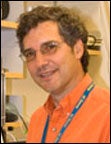Anschutz researcher co-recipient of $2.4 million grant
The National Institutes of Health (NIH) recently awarded nearly $2.4 million to University of Colorado Anschutz Medical Campus researcher Diego Restrepo, and Elba Serrano of New Mexico State University Las Cruces, to help them prepare minority students and those with disabilities for careers in neuroscience.
"We are partnering with two undergraduate programs, one at New Mexico State University, and the other at the UC Denver downtown campus," said Restrepo, professor of cell and developmental biology and co-director of the School of Medicine's Center for NeuroScience. "This grant is very important because the number of disabled and minority Ph.D. students is small in general and those in neuroscience even smaller."
Restrepo and Serrano will share the $2.39 million grant along with Sondra Bland at the UC Denver downtown campus. The money will support undergraduates from both universities, home to a widely diverse student body. Along with serving as a student "pipeline" to the Center for NeuroScience, UC Denver will provide seminars, mentoring, enhanced curricula and hands-on research experience.
The NIH issued grants totaling $10.3 million over the next five years for five programs targeting minorities studying neuroscience. The funding is part of NIH's Blueprint for Enhancing Neuroscience Diversity Through Undergraduate Research Education Experiences. It connects research universities to institutions with neuroscience students from traditionally underrepresented groups.
"By forming strong collaborations between institutions, these programs will maximize the impact of limited resources while fostering participation and diversity in neuroscience research," said neurobiologist Alberto Rivera-Rentas, Ph.D., who oversees training programs at NIH's National Institute of General Medical Sciences. "We expect that these partnerships will serve as models for future NIH initiatives designed to increase diversity in the biomedical workforce."
According to Restrepo, the Anschutz Medical Campus has one of the best-funded neuroscience programs in the Rocky Mountain West with $27 million so far in NIH research grants. But he stressed the need for more diversity.
In 2005, African Americans, Latinos and Native Americans accounted for 31 percent of the population between the ages of 18 and 24. But a survey of neuroscience departments that year showed that these groups made up just 12 percent of pre-doctoral students, 8 percent of post-doctoral students and 4 percent of neuroscience faculty.


